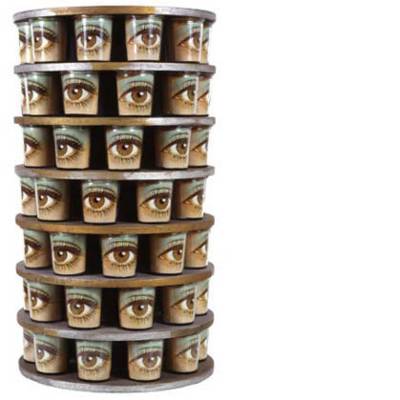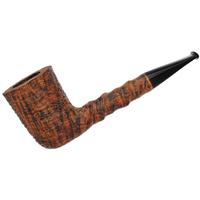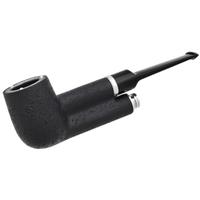Pipes in Art
- Thread starter claypipesarchaeologist
- Start date
You are using an out of date browser. It may not display this or other websites correctly.
You should upgrade or use an alternative browser.
You should upgrade or use an alternative browser.
SmokingPipes.com Updates
- Status
- Not open for further replies.
From the last painting on page 8: I looked up Ngapuhi; she's a Maori from New Zealand's northern island. Knew she didn't quite look American.
It's not our first Maori smoking. Those Dutch peasants we would love to party with got around the world pretty well. I've relearned much history doing this and especially the influence of the Dutch India Companies. You can watch the growth of both the tobacco industry and also the opium industry from following those Dutch ships. New Zealand and Australia were on that route. It seems the Maori women picked up the tobacco habit more so than the men. A similar thing happened in China with the Dowager Empress being a large influence to female China at that time.
I'm sounding like the show "Big History." There are worse things to sound like, though. That's an amazing program.
I'm sounding like the show "Big History." There are worse things to sound like, though. That's an amazing program.
Most educational thread on the forum. Yes, I learned stuff I didn't know about Maoris looking up Ngapuhi. I imagine Big History's on cable, so I don't get it.
Did I mention how brilliant this thread is?
This thread is brilliant.
I want to become a Dutch peasant.
Good to see Broodthaers, one of my faves, a great visual poet.






Markus Raetz - "Non Pipe" - 1992

Timm Ulrichs - "Ceci n'est pas une pipe de Magritte" - 1968

Gavin Turk - "Godot's Day Off" - 1999

This thread is brilliant.
I want to become a Dutch peasant.
Good to see Broodthaers, one of my faves, a great visual poet.






Markus Raetz - "Non Pipe" - 1992

Timm Ulrichs - "Ceci n'est pas une pipe de Magritte" - 1968

Gavin Turk - "Godot's Day Off" - 1999

You're right about that.
It's amazing how many Magritte pipe variation tributes there are, but Turk had to throw in Beckett as well for full measure LOL
I'd still rather be a retrodutch peasant than a bewildering ironic postmodernist.
:wink:
The Pipe
Charles Baudelaire
I am the pipe of an author;
One sees by my color,
Abyssinian or Kaffir,
That my master's a great smoker.
When he is laden with sorrow,
I smoke like a cottage
Where they are preparing dinner
For the return of the ploughman.
I clasp and lull his soul
In the wavy blue web
That rises from my fiery mouth.
I give forth clouds of dittany
That warm his heart and cure
His mind of its fatigue.
:
:
:
trans. by William Aggeler:
 :
:
It's amazing how many Magritte pipe variation tributes there are, but Turk had to throw in Beckett as well for full measure LOL
I'd still rather be a retrodutch peasant than a bewildering ironic postmodernist.
:wink:
The Pipe
Charles Baudelaire
I am the pipe of an author;
One sees by my color,
Abyssinian or Kaffir,
That my master's a great smoker.
When he is laden with sorrow,
I smoke like a cottage
Where they are preparing dinner
For the return of the ploughman.
I clasp and lull his soul
In the wavy blue web
That rises from my fiery mouth.
I give forth clouds of dittany
That warm his heart and cure
His mind of its fatigue.
:
:
:
trans. by William Aggeler
:The Pipe
Stéphane Mallarmé
Yesterday I found my pipe while pondering a long evening of work, of fine winter work. Thrown aside were my cigarettes, with all the childish joys of summer, into the past which the leaves shining blue in the sun, the muslins, illuminate, and taken up once again was the grave pipe of a serious man who wants to smoke for a long while without being disturbed, so as better to work: but I was not prepared for the surprise that this abandoned object had in store for me; for hardly had I drawn the first puff when I forgot the grand books I was planning to write, and, amazed, moved to a feeling of tenderness, I breathed in the air of the previous winter which was now coming back to me. I had not been in contact with my faithful sweetheart since returning to France, and now all of London, London as I had lived it a year ago entirely alone, appeared before my eyes: first the dear fogs that muffle one’s brains and have an odor of their own there when they penetrate beneath the casements. My tobacco had the scent of a somber room with leather furniture sprinkled by coal dust, on which the thin black cat would curl and stretch; the big fires! and the maid with red arms pouring coals, and the noise of those coals falling from the sheet-iron bucket into the iron scuttle in the morning—when the postman gave the solemn double knock that kept me alive! Once again I saw through the windows those sickly trees of the deserted square—I saw the open sea, crossed so often that winter, shivering on the deck of the steamer wet with drizzle and blackened from the fumes—with my poor wandering beloved, decked out in traveller’s clothes, a long dress, dull as the dust of the roads, a coat clinging damply to her cold shoulders, one of those straw hats with no feather and hardly any ribbons that wealthy ladies throw away upon arrival, mangled as they are by the sea, and that poor loved ones refurbish for many another season. Around her neck was wound the terrible handkerchief that one waves when saying goodbye forever.
trans. by Henry weinfield
Smoking Spiritualized
Ralph Erskine
This Indian weed now wither'd quite,
'Tho' green at noon, cut down at night,
Shows thy decay;
All flesh is hay.
Thus think, and smoke tobacco.
The pipe so lily-like and weak,
Does thus thy mortal state bespeak.
Thou art ev'n such,
Gone with a touch.
Thus think, and smoke tobacco.
And when the smoke ascends on high,
Then thou behold'st the vanity
Of worldly stuff,
Gone with a puff.
Thus think, and smoke tobacco.
And when the pipe grows foul within,
Think on thy soul defil'd with sin;
For then the fire,
It does require.
Thus think, and smoke tobacco.
And seest the ashes cast away;
Then to thyself thou mayest say
That to the dust
Return thou must.
Thus think, and smoke tobacco.
Was this small plant for thee cut down?
So was the plant of great renown;
Which mercy sends
For nobler ends.
Thus think, and smoke tobacco.
Doth juice medicinal proceed
From such a naughty foreign weed?
Then what's the pow'r
Of Jesse's flow'r?
Thus think, and smoke tobacco.
The promise, like the pipe, inlays,
And by the mouth of faith conveys
What virtue flows
From Sharon's rose.
Thus think, and smoke tobacco.
In vain th' unlighted pipe you blow;
Your pains in inward means are so,
'Till heav'nly fire
Thy heart inspire.
Thus think, and smoke tobacco.
The smoke, like burning incense tow'rs
So should a praying heart of yours,
With ardent cries,
Surmount the skies.
Thus think, and smoke tobacco.
:Ralph Erskine
This Indian weed now wither'd quite,
'Tho' green at noon, cut down at night,
Shows thy decay;
All flesh is hay.
Thus think, and smoke tobacco.
The pipe so lily-like and weak,
Does thus thy mortal state bespeak.
Thou art ev'n such,
Gone with a touch.
Thus think, and smoke tobacco.
And when the smoke ascends on high,
Then thou behold'st the vanity
Of worldly stuff,
Gone with a puff.
Thus think, and smoke tobacco.
And when the pipe grows foul within,
Think on thy soul defil'd with sin;
For then the fire,
It does require.
Thus think, and smoke tobacco.
And seest the ashes cast away;
Then to thyself thou mayest say
That to the dust
Return thou must.
Thus think, and smoke tobacco.
Was this small plant for thee cut down?
So was the plant of great renown;
Which mercy sends
For nobler ends.
Thus think, and smoke tobacco.
Doth juice medicinal proceed
From such a naughty foreign weed?
Then what's the pow'r
Of Jesse's flow'r?
Thus think, and smoke tobacco.
The promise, like the pipe, inlays,
And by the mouth of faith conveys
What virtue flows
From Sharon's rose.
Thus think, and smoke tobacco.
In vain th' unlighted pipe you blow;
Your pains in inward means are so,
'Till heav'nly fire
Thy heart inspire.
Thus think, and smoke tobacco.
The smoke, like burning incense tow'rs
So should a praying heart of yours,
With ardent cries,
Surmount the skies.
Thus think, and smoke tobacco.
 :
:I might want to be a Dutch peasant for a day, but not for too long - I like my computer! Anyone else wanting a clay pipe after seeing all of these paintings?
Hey ed, tell us more about yourself; all I know is you're 6'5" and used to be blond. Why do you like art so much?
Off to smoke me some naughty foreign weed now.
Hey ed, tell us more about yourself; all I know is you're 6'5" and used to be blond. Why do you like art so much?
Off to smoke me some naughty foreign weed now.
Actually, I'm 6'7" and a retired Math teacher. My interest in Art comes from me realizing early on that life is short. When it's over it's over. So I try to spend my time with the most positive parts of being human. I have always been a musician and was always interested in personal growth in that field and it just spread to all fields of human endeavor. I'm interested in literature, art, music, food , science, history, religion, etc. I really love trying to grow and learn everyday. I've always tended to start with the modern and move back. Takemitsu before Messaien before Debussy, Miles before Duke before Armstrong.
It's the same with art. I hung around the Art dept in college and was at most of the exhibitions of both faculty and students.
I think I'm looking for a combination of technical skill and open thinking in a piece. I'm not a fan of a blue square on a piece of canvas as a work of art. I've learned so much with this thread; history, sociology, and the art itself. I had never heard of Andre Derain and he's fast becoming one of my favorites. I also love Willem Maris's cows and horses and I've discovered another artist I'm just come across in Germany who is well known apparently to everyone but me, August Macke. Fantastic stuff with color and form and apparently close to Matisse and Derain. I'm posting some of his work sometime this weekend.
Now it's time for tit for tat and I'd like to hear about you and the others who are regulars on this thread.
It's the same with art. I hung around the Art dept in college and was at most of the exhibitions of both faculty and students.
I think I'm looking for a combination of technical skill and open thinking in a piece. I'm not a fan of a blue square on a piece of canvas as a work of art. I've learned so much with this thread; history, sociology, and the art itself. I had never heard of Andre Derain and he's fast becoming one of my favorites. I also love Willem Maris's cows and horses and I've discovered another artist I'm just come across in Germany who is well known apparently to everyone but me, August Macke. Fantastic stuff with color and form and apparently close to Matisse and Derain. I'm posting some of his work sometime this weekend.
Now it's time for tit for tat and I'd like to hear about you and the others who are regulars on this thread.
I am a yobbo.
I am a failed artist.
I am a lousy poet.
I used to maintain several blogs, they come as close to anything else at describing who I am, or who I was, or who I will become...
https://www.blogger.com/profile/14706450196335510065
At the moment I'm awaiting the great convergence of all souls back into the singular perfect Godhead,
everything else is just icing on the cake.
: :
:
I am a failed artist.
I am a lousy poet.
I used to maintain several blogs, they come as close to anything else at describing who I am, or who I was, or who I will become...
https://www.blogger.com/profile/14706450196335510065
At the moment I'm awaiting the great convergence of all souls back into the singular perfect Godhead,
everything else is just icing on the cake.
:
 :
:One of my favorite American artists, Thomas Hart Benton, smoking a pipe that appears to be a Dunhill...


I must have looked at dozens of Benson's drawings, paintings, and prints and was surprised at not finding any pipes. He was so enamored with the working class in his works, and pipes would have been totally appropriate in most. Maybe he thought the pipe might be seen as an upper crust activity and defeat his purpose in showing workers. He's one of the artists who surprised me by lack of pipes. I would also love to see an Edward Hopper with a pipe. It would have been so appropriate in so many of his works. In Nighthawks either of those men could be smoking a pipe though he did get cheap cigars into the painting.
- Status
- Not open for further replies.





























